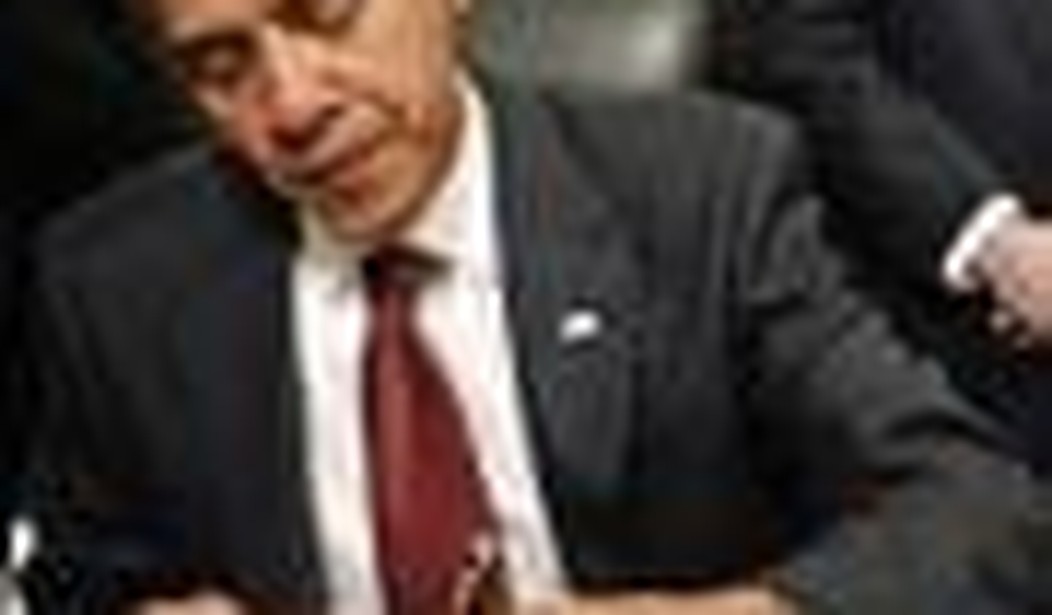Throughout the last election and into his new administration, President Obama’s race has been the preoccupation of much of the country. Now with that issue blessedly behind us, the more important race for his signature in the early days of his administration is on. At issue is whether he will grow in office to leadership that adopts an expansive understanding of the basis for America’s extraordinary success before he makes decisions reflecting a more negative view of this country. In the headlong race to make him commit to a direction very early in his administration, the signs are not promising.
President Obama arrives in office with extraordinary expectations from his own side of the aisle, a side he is predisposed to associate himself with. Ideologues of varying degrees of socialism want sweeping changes in wealth redistribution, socialized medicine, and expansive government. Historical Democratic self-interest groups want payback through the advancement of their interests in union membership, environmental restrictions, and funding for all manner of social activism. Congressional Democrats, blocked for years from the unrestrained spending for which they are so well known, want the floodgates opened. Opened wide and immediately. From these groups we see a trillion-dollar, pork-laden spending bill, pending rules that would force unions on unwilling workers, and a major shift to government taking ownership positions in public companies. And all this must be done within a month of taking office.
Could it be that the backers know the office itself quickly tempers the zeal of its occupants? Is that why there is this race to “get things done” on so many liberal fronts? It is a race to get President Obama’s signature in place before alternate realities can intrude. Decisions made now will be very hard to undo so one must hope the president considers his decisions well and acts with caution. He has, however, very limited legislative and no executive experience, so he must rely on personal experience and judgment to guide his decisions. In this there is cause for concern.
On the one hand, President Obama’s life has been a series of vignettes that occupies but one small corner of the American reality. A youth in Hawaii; the emotion and heat of urban college years amplified with components of race, drugs, and activism; community organizer in Chicago; and being shepherded into a brief stint in the mud of Illinois politics hardly exposed him to the reality of the other 300 million Americans going about everyday life. All this reasonably shapes the world as he sees it, but it also provides the foundation for a significantly distorted view of the American experience. Can he accept the possibility that his perspective of America and the world is profoundly shaped by the narrow and highly ideological group with whom he has spent his life? Let’s hope so.
On the other hand, the long campaign for president provided the president with a basis for a more comprehensive understanding of the American people as a whole. While giving speeches that incessantly repeated the woes of Americans, surely he took note of the millions of family homes, row upon row of them, complete with cars, furniture, pools, and kids. He interacted with hundreds of thousands of well-fed and well-dressed people who donated their own money to his campaign. How could he not have seen tens of thousands of miles of highways, with shopping malls and corporate America lined up on both sides? Big cities or small towns, the sheer magnitude of American enterprise is everywhere apparent, most of it built within the last three generations. Will the realization come to him that it is people of all kinds who not only built these things but also own them? That a culture of personal economic freedom provided the means for them to do so? That people of all races, nationalities, and abilities benefited from this freedom, if not at all times equally? When there was injustice, it was in preventing groups from participating in the system, not in a failure to redistribute its benefits.
President Obama’s personal history gave him little exposure to the broad, non-racial economic America that beats steadily day after day. But it built all we see around us and is the best resource to accomplish the goals Mr. Obama wants to achieve. Personal economic freedom is reduced by the many measures being promoted in the early days of this administration, as in forcing union membership everywhere rather than choosing it where needed. Slowing the economic engine of growth does not benefit the passengers in the rear cars. They just arrive later, if at all.
So the race is on. On the one side, the forces wanting immediate and sweeping social intervention and activism. Taxes that redistribute, social spending to heights only the ideologically blinded can ignore, and government control over health and “necessities.” On the other side, those urging caution and the need for time to weigh the risks of reducing economic freedom. One side has urgency written large, the other only a history of extraordinary advancement and a faith in the virtues of freedom to recommend it. Restrict that freedom and you have Russia. Add it and you have an emergent China.
There is no apparent middle ground between the two sides. As in any race, one side will win and the other will lose. The difference is that in this race, if the loser is economic freedom it may never be able to race in America again. The presidency, however, has a long history of changing those who hold the office, if only by a realization of the magnitude of the consequences of decisions made there.
Will President Obama act before it broadens him by providing the perspective that comes with such responsibility?
We will know within six months.









Join the conversation as a VIP Member